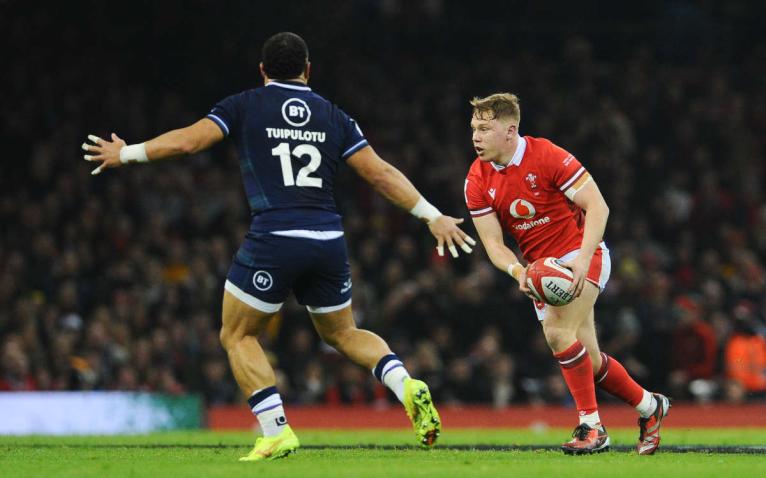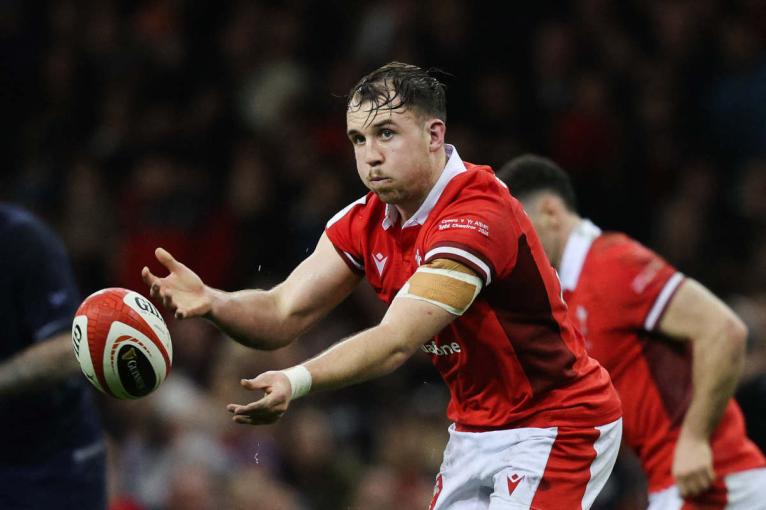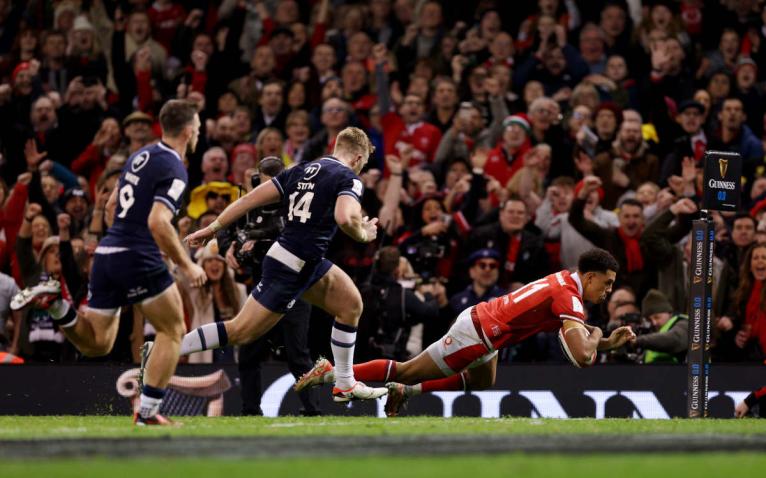A wise man once reckoned that tactics mean doing what you can with what you have.
Be pragmatic, in other words.
Disagreements can still result, sometimes resulting in voices being raised amid threats of ring craft being brought to the table. Rewind to the Brewery Field in Bridgend in the dim and distant past when the then Neath team boss Brian Thomas instructed Jonathan Davies he wanted him to rein in his instinctive attacking play for the afternoon.
“Brian said to me: ‘Jonathan, whenever you get the ball I want you to bang it as far downfield as you can,’’’ Davies wrote in his book, Code Breaker.
“I said: ‘I’m sorry, Brian, I’ll decide what to do when I get the ball. I’ll play it as I see fit.’
“’Never mind about all that,’ he shouted. ‘I want it in their half.’
“I took off my shirt and offered it to him. ‘Do you want this?’ I demanded.
“’Do you want a broken nose?’ he asked.
Happily, Davies’ features stayed intact. He also put in several long touch-finders that day but insisted he only did so because that’s what his instincts told him to do. The celebrated cross-coder never was a man who played by numbers.

At 23 and making just his fourth Test start at No. 10, Sam Costelow was never going to offer his Wales jersey to the coaches last weekend, whatever tactics he was asked to employ against Scotland. For a comparatively new boy in camp, who is striving to cement his place in the run-on side, arguing with Warren Gatland, Rob Howley and Alex King might not have been the best way to progress his Test career.
Costelow thus put boot to ball a fair bit during his 35 minutes on the field. Bombs were hoisted, often from behind the gain-line, but Scotland largely dealt with them with ease, with Welsh chasers unable to reach them. There was no hint of the exciting attacking play the youngster from Pencoed showed against England in Cardiff last summer, when Costelow opened the Red Rose defence with skilful use of the inside ball and put in the cross-kick from where Wales scored their opening try.
Instead, it all looked a shade robotic. One set of player ratings for the game saw the youngster given a one out of 10 for his efforts, complete with a no-nonsense summing up: “Failed on just about every metric.” We call that ‘stinging’.
Maybe a definitive judgement on Costelow should be reserved. Even so, his Scarlets team-mate Ioan Lloyd quite looked the part after coming on as replacement, with the situation tailor-made for the 22-year-old whose talent comes with serious boldness.
Were he and his half-back partner Gareth Davies playing to orders or did they and others simply go into their shells during one of the least impressive Welsh halves of rugby even grey beards who lived through the frequent horrors of the 1980s and 1990s could recall?
Wales were markedly improved after the break, when Scotland lost their discipline, started making errors and the home team began to win quick ball – in contrast to the opening half, when some Welsh attacks came close to taking the form of medieval sieges: trudge forward, set up camp, trudge forward again, set up camp, repeat the dose.
Any fly-half would have found the going tough under such circumstances, so maybe a definitive judgement on Costelow should be reserved. Even so, his Scarlets team-mate Ioan Lloyd quite looked the part after coming on as replacement, with the situation tailor-made for the 22-year-old whose talent comes with serious boldness.

Trampling all over Wales by the time Lloyd came on, Scotland lost their edge and accuracy, with indiscipline blighting their play. Spaces began to open up and momentum shifted Wales’ way. Amid the chaos and confusion, the dark blue defence was increasingly breached and the crowd responded. A comeback of serious proportions was on. Lloyd was the right man in the right place at the right time, even if Wales ultimately fell just short.
He starts against England on Saturday, with an opportunity to convince some who might still question whether he can dictate play from the start of matches.
Before this season, he had begun just eight times at No. 10 in senior rugby. He has featured regularly there for the Scarlets since but is still not stacked with high-level experience for such a key role. Doubters will wonder if he yet has the necessary tactical appreciation for the job. Admirers will recall how he bossed an outstanding Scarlets display against Cardiff at the Arms Park in December. If there has been a better show by a Welsh fly-half this season, we really ought to hear about it.
Attritional rugby doesn’t seem the way for the Wales class of 2024, who, on the evidence of the second half last weekend, seem better equipped to play a game based on pace, guile and daring: less bashing down doors, perhaps, and more remembering how to pick locks.
In many ways, his effort against Scotland went a shade under the radar. Aaron Wainwright, Tommy Reffell and Tomos Williams deservedly attracted the main plaudits, but Lloyd’s distribution, half-breaks and kicks, whether for touch or, on one occasion over the top of the defence with the outside of his right boot, added variety to Wales’ performance and gave them width while keeping the Scots guessing.
With Lloyd, the ball started reaching Wales’ centres and wings often and quickly. “You can’t start a fire without a spark,” sang Bruce Springsteen. To some, Lloyd was the spark for Wales in the second 40 against Scotland.
Perhaps the wider question is how Gatland sees Wales developing following their golden generation of players, with the physicality that stamped the play of Welsh teams during the New Zealander’s first stint in charge not obviously the standout feature of the present group.
Attritional rugby doesn’t seem the way for the Wales class of 2024, who, on the evidence of the second half last weekend, seem better equipped to play a game based on pace, guile and daring: less bashing down doors, perhaps, and more remembering how to pick locks. Twickenham this weekend will tell us more.
Seven changes see Williams partnering Lloyd from the first whistle, with a fresh front row in the shape of Gareth Thomas, Elliot Dee and Keiron Assiratti, Alex Mann coming in at blindside flanker and a fit-again George North restored at outside centre.
Corey Domachowski is unlucky not to hold his place at loosehead after a strong 80 minutes against Scotland, with the Cardiff man scrummaging, tackling and carrying with real conviction. But Thomas has himself performed strongly for Wales in the past and is evidently still considered ahead of the rest.

At full-back, Cam Winnett had a largely encouraging Test debut, while out wide Rio Dyer once again showed what a threat he can pose. Everyone is under scrutiny because it’s a Test but maybe Josh Adams’ effort will be assessed more closely than most others after an uncharacteristically off-key show in round one. He will know a repeat performance could leave him fighting to hold his place for round three.
What Wales would give for a wing or centre who can boot the ball in the way James Lowe does for Ireland – swathes of territory gained for his side achieved with seemingly minimal effort – but such individuals are rare gems indeed.
Results may not be easy to come by in the coming weeks – Wales follow their trip to London with a trek to Dublin to face Ireland, before hosting France in Cardiff – but they may yet reap long-term rewards from having faith in their players’ strengths.
No, the challenge for Gatland is to make the best of what he has and that means coming up with a game-plan that suits the players.
Results may not be easy to come by in the coming weeks – Wales follow their trip to London with a trek to Dublin to face Ireland, before hosting France in Cardiff – but they may yet reap long-term rewards from having faith in their players’ strengths.
Such a strategy worked for the Kiwi when he first came in as Wales coach. And just maybe, with a fresh style, in time it could work again.


Comments
Join free and tell us what you really think!
Sign up for free